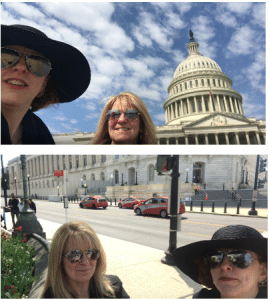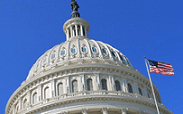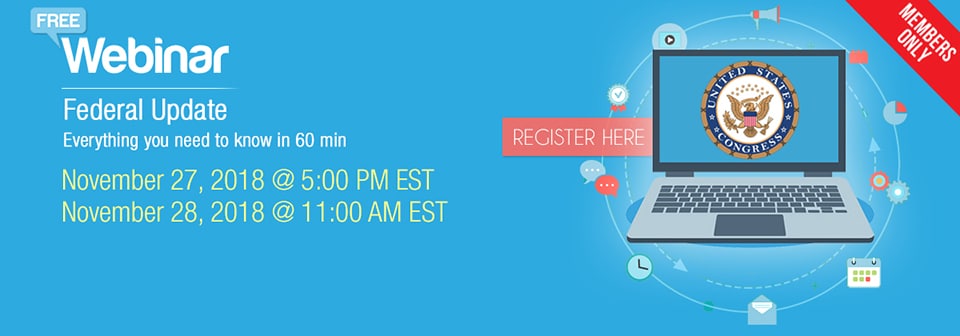29 Apr2019
By Linda Minor

Being new to AACTE, I learned a lot about what to expect during Day on the Hill when Deborah Koolbeck and I recently went to the Capitol. I have never been on the Capitol grounds before, although I have lived in the DC area for over 20 years, and it is beautiful. The weather was perfect. View video clip about Capitol Grounds.
So, what can you expect during Day on the Hill? Tuesday will be a full-day of orientation at the hotel where you will build skills and prepare for their meetings with your congressional offices. Then, on Wednesday morning you will be bused to Capitol Hill for scheduled appointments with your elected officials. “But what about their luggage,” I asked? Attendees can bring luggage on the bus to the hill—or you can stay in town a little longer and take advantage of all the activities DC has to offer. View video clip about luggage.
29 Apr2019
By Ward Cummings
 In anticipation of Washington Week’s Day on the Hill, AACTE’s premier advocacy event, members of the Committee on Government Relations and Advocacy hosted a webinar on Thursday, April 18 to answer questions about the event. How to schedule a congressional meeting, how to develop an advocacy message, and how to walk into a U.S. Senator’s office with confidence, are just samples of the many issues discussed during the webinar. The recorded webinar, Are You Ready for a Day on the Hill? is now available to watch on the AACTE website.
In anticipation of Washington Week’s Day on the Hill, AACTE’s premier advocacy event, members of the Committee on Government Relations and Advocacy hosted a webinar on Thursday, April 18 to answer questions about the event. How to schedule a congressional meeting, how to develop an advocacy message, and how to walk into a U.S. Senator’s office with confidence, are just samples of the many issues discussed during the webinar. The recorded webinar, Are You Ready for a Day on the Hill? is now available to watch on the AACTE website.
During the webinar, an experienced panel of experts shared their personal stories and provided guidance on the methods and reasons for advocacy. Additionally, they explained what attendees at this year’s Washington Week in the nation’s capital can expect when they attend Day on the Hill events.
Webinar attendees were instructed on what things to arrange prior to traveling, who to involve from their institution, how to request an appointment with their legislator, and how to prepare for the meeting. It was a one-stop-shop for all things related to the event.
29 Apr2019
By Michael Maher

What does it mean to be a leader? Are leaders born or are they developed?
If you Google the word “Leader,” depending on the day, you may end up with between 4 and 6 billion hits. There is certainly no shortage of opinions, courses, or books on leadership. Some individuals are leaders by virtue of their title, others are considered leaders whether or not they have a title. Whether leadership has been thrust upon you or it has slowly developed over time, you understand that leadership carries the challenge of expectations and obligations.
As a person who thinks about the concept of leadership quite a bit, it seems to me that, although some individuals may embody characteristics that lend themselves to leadership, true leaders are developed over time through a combination of professional development and lived experience.
As a leader you have an obligation to those you lead, an obligation to the profession, and an obligation to yourself. In the field of education, and in teacher preparation in particular, there are no shortage of leaders. Those who are the most impactful, however, are the ones who continuously seek to improve their knowledge, skills, and relationships.
12 Apr2019
By Denise Pearson

Historically black colleges and universities (HBCUs) and other minority-serving institutions (MSIs) are uniquely positioned to engage higher education policymakers, researchers, practitioners, and other stakeholders to increase the participation of males of color throughout the teacher pipeline. To that end, Project Pipeline Repair: Restoring Minority Male Participation and Persistence in Educator Preparation Programs is a three-year, research-based initiative that emphasizes cross-sector collaboration as foundational to addressing three interconnected problems: nationwide teacher shortages, the lack of teacher diversity, and the teaching profession narrative.
On October 2-5, 2019, the State Higher Education Executive Officers Association (SHEEO) will host the Project Pipeline Repair Summit that will bring together P-16 policy, institutional, and community leaders to culminate this collaboration between state agencies, HBCUs, and partnering school districts in four states (Arkansas, Louisiana, Mississippi, and South Carolina). During the Summit, we will engage in deep conversations with higher education policy and practice experts, including educator preparation researchers and practitioners. Representatives from other MSIs and organizations with similar aims are welcomed, and will also be present to expand the learning and build capacity in these important policy and practice areas.
12 Apr2019
By Jane E. West
This blog post is written by AACTE consultant Jane West and is intended to provide update information. The views expressed in this post do not necessarily reflect the views of AACTE.
Congress was busy this week trying to wrap a few things up as they enter an extended recess period. With the timeline for the election pressing, the momentum will continue. Remember the first Democratic presidential candidate debate is in June—just two months away! So the pressure is on.
- House Makes Magic Move on Budget!
The Budget Control Act, as it stands now, would require dramatic cuts for education and other programs for FY 2020, which begins October 1. In order to avoid significant cuts to education and other programs, the Budget Control Act needs to be amended to increase the spending caps. While the House Budget Committee adopted new spending caps this week, Democrats were unable to find consensus and bring that provision to the House floor.
But do not despair! Where there is a will there is a way! On Wednesday the House adopted something called a “deeming resolution” which provides for $1.3 trillion for the 12 spending bills in FY 2020. The “non-defense discretionary” portion (which includes education) will be $34 billion over the FY 2019 spending level. This deeming resolution paves the way for Appropriations Chair, Rep. Nita Lowey (D-NY), to divvy up the funding into 12 pots—one for each of the appropriations bills.
05 Apr2019
By Bryan S. Zugelder
 As co-editors, we are seeking chapter authors for a book we are publishing with IGI Global for release in 2020 titled Handbook of Research on Leadership and Advocacy for Children and Families in Rural Poverty. This interdisciplinary book will address issues related to education, counseling, social work, public policy, health, and leadership.
As co-editors, we are seeking chapter authors for a book we are publishing with IGI Global for release in 2020 titled Handbook of Research on Leadership and Advocacy for Children and Families in Rural Poverty. This interdisciplinary book will address issues related to education, counseling, social work, public policy, health, and leadership.
Education researchers and practitioners are invited to submit a 1,000 to 2,000 word chapter proposal by April 25, 2019. All submitted chapters will undergo a double-blind review.
02 Apr2019
By Jerrica Thurman
 AACTE is excited to announce registration is open for its 2019 Washington Week. This signature event is held annually in the nation’s capital, with participation from AACTE and the Association of Teacher Educators (ATE) state chapter leaders, Holmes Scholars, and AACTE members and non-members alike interested in advocating for the profession. Under the theme “Your Voice Matters,” this year’s Washington Week will be held June 2-5 at the Renaissance Arlington Capital View Hotel in Arlington, VA, and on Capitol Hill.
AACTE is excited to announce registration is open for its 2019 Washington Week. This signature event is held annually in the nation’s capital, with participation from AACTE and the Association of Teacher Educators (ATE) state chapter leaders, Holmes Scholars, and AACTE members and non-members alike interested in advocating for the profession. Under the theme “Your Voice Matters,” this year’s Washington Week will be held June 2-5 at the Renaissance Arlington Capital View Hotel in Arlington, VA, and on Capitol Hill.
08 Mar2019
By Ward Cummings

We all know educator preparation is held accountable at the state level. That is why the ability to advocate and engage with your state elected official and agencies is such a consequential part of developing and preparing educators. For those interested in engaging with their elected officials, the question then becomes, where do I start and how can I build the strong relationships that are such a vital part of effective advocacy?
On March 14, the members of the AACTE Government Relations and Advocacy Committee hosted a webinar to address these and other important questions. The organizing theme of the webinar was identifying and constructing the building blocks of effective and productive engagement with legislators, their staff, and key regulators at the state level.
07 Feb2019
By Jerrica Thurman
 The members of the Learning First Alliance (LFA) will host Public Schools Week, March 25-29, 2019, to show the great things happening every day in public schools–and show the potential for greater things.
The members of the Learning First Alliance (LFA) will host Public Schools Week, March 25-29, 2019, to show the great things happening every day in public schools–and show the potential for greater things.
This second annual event encourages school leaders to invite community members, lawmakers, parents and others to visit and see the wide array of programs and high-quality opportunities offered, honor students’ accomplishments and see the joys and challenges of teaching and learning in public schools.
“Public education is the foundation for students’ success, the growth of communities, and our nation’s future,” said Nathan R. Monell, CAE, executive director of the National PTA and 2018-19 chair of the Learning First Alliance, a coalition of 12 national education organizations representing more than 10 million parents, teachers, administrators, specialists, school board members and teacher educators. “Public schools educate 90 percent of our nation’s students and are providing talented professionals for jobs in the corporate and public sectors as well as the military. It’s vitally important that we have a strong system of public schools across the United States.”
17 Jan2019
By Jacqueline Rodriguez

AACTE is collaborating with the National Association of State Directors of Teacher Education and Certification (NASDTEC) to present the free webinar, An Intentional Focus on Mitigating Risks Across the Continuum. The webinar will take place on Thursday, January 24, from 7:00-8:00 p.m. EST. Advanced registration is required to participate.
The profession of education is highly complex, with educators having to make multiple decisions in their daily work. Competing tensions and greatly nuanced variables that are inherent in this field can add to the vulnerabilities and risks that educators must navigate, especially when it comes to professional decision making.
04 Jan2019
By Imani Stephens
This article and photo originally appeared on Cronkite News and is reprinted with permission.
 A record 1,800 teachers were on ballots across the country this fall, and the National Education Association estimates that as many as 1,100 of them won their races.
A record 1,800 teachers were on ballots across the country this fall, and the National Education Association estimates that as many as 1,100 of them won their races.
Not a perfect score, but good enough for educators to boast that what they have been calling the Year of the Teacher could be just the first of many such years.
“Educators stepped out of their classrooms and into the public realm to run for the legislature and they did it fearlessly, and they did it in a way that made all us proud of them,” said Joe Thomas, Arizona Education Association president.
03 Jan2019
By Jerrica Thurman

AACTE and fellow members of the Learning First Alliance issued a joint statement on December 19, 2018 that emphasizes the Federal School Safety Commission should help schools provide mental health resources to prevent violence. LFA members said the federal government should focus its next steps on resources and training more mental health specialists to ensure safety of students and school staff:
A new federal report misses a high-profile opportunity to bring leadership and resources to social-emotional and mental health needs in K-12 schools, the Learning First Alliance, a coalition of 12 major national education organizations that represents 10 million parents, teachers, administrators, school counselors, specialists, teacher educators, and school board members, stated in response to recommendations by the federal Commission on School Safety, led by U.S. Secretary of Education Betsy DeVos. Simply talking about the need for something to be done without creating the ability for schools to have the tools to reach more students in need avoids a core responsibility.
03 Jan2019
By AACTE
AACTE President/CEO Lynn M. Gangone issued the following statement on December 20, 2018 regarding the latest Federal School Safety Commission report:
On December 18, 2018, the Federal School Safety Commission released its final report, outlining the background of its work and providing recommendations for action across three broad areas: 1) prevent, 2) protect and mitigate, and 3) respond and recover. While AACTE appreciates the effort of the current Administration to explore the critical issue of school safety, the report raises significant concerns and poses further questions.
The Commission’s report talks about the social-emotional and mental health needs of our K-12 students; however, it does not address capacity building for schools to have the tools to reach more students. The recommendation to rescind the current guidance on school discipline, created to combat the disproportionate suspension and expulsion of students of color, students with disabilities, and LGBTQ youth, is also highly problematic and contrary to our Association’s values of equity and inclusion. AACTE President and CEO Lynn M. Gangone testified before the Commission and joined others in strongly discouraging the use of federal funds to arm teachers as a solution to ensure school safety, yet the report does not eliminate the option of training and arming school personnel with firearms.
19 Nov2018
By Deborah Koolbeck

With the election over, Congress returns to Washington, D.C. to wrap up the year—and for some members, their time in Washington. As the U.S. House of Representatives and U.S. Senate start the lame-duck session, some attention is turning to the 116th Congress that begins in January.
With Congress finishing the Labor, Health & Human Services, Education and Related Agencies appropriations bill on time (September 30), it is important to remember that a large portion of the federal government is operating under a Continuing Resolution (CR). With a deadline of December 7, the CR brings with it contention and the potential for a government shutdown. It is also unclear what else the Republican majority will want to do in the last weeks of its leadership in the House and what the Senate can get done as well.
16 Nov2018
By Mary Murray

Ohio recently proved that collaboration across education stakeholders can increase communication and partnerships, as well as shape state legislation.
In fall 2017, a superintendent group representing the Western Ohio Advocacy Network (WOAN) worked with Ohio Senator Matthew Huffman to craft the Ohio School Deregulation Act (SB216), intended to increase local control of education. The initial bill proposed reverting back to having only two general education licensure bands: Grades 1-8 and 7-12, a radical departure from Ohio’s existing licensure bands: PK- 3, 4-9, and 7-12. SB 216 also proposed moving teacher licensure bands from Ohio’s Administrative Code (controlled by the Ohio Department of Education) to Ohio’s Revised Code (with legislative oversight), which meant that any future changes would require legislative action.








 In anticipation of Washington Week’s Day on the Hill, AACTE’s premier advocacy event, members of the Committee on Government Relations and Advocacy hosted a webinar on Thursday, April 18 to answer questions about the event. How to schedule a congressional meeting, how to develop an advocacy message, and how to walk into a U.S. Senator’s office with confidence, are just samples of the many issues discussed during the webinar. The recorded webinar, Are You Ready for a Day on the Hill? is now available to watch on the AACTE website.
In anticipation of Washington Week’s Day on the Hill, AACTE’s premier advocacy event, members of the Committee on Government Relations and Advocacy hosted a webinar on Thursday, April 18 to answer questions about the event. How to schedule a congressional meeting, how to develop an advocacy message, and how to walk into a U.S. Senator’s office with confidence, are just samples of the many issues discussed during the webinar. The recorded webinar, Are You Ready for a Day on the Hill? is now available to watch on the AACTE website. 

 As co-editors, we are seeking chapter authors for a book we are publishing with IGI Global for release in 2020 titled Handbook of Research on Leadership and Advocacy for Children and Families in Rural Poverty. This interdisciplinary book will address issues related to education, counseling, social work, public policy, health, and leadership.
As co-editors, we are seeking chapter authors for a book we are publishing with IGI Global for release in 2020 titled Handbook of Research on Leadership and Advocacy for Children and Families in Rural Poverty. This interdisciplinary book will address issues related to education, counseling, social work, public policy, health, and leadership.

 The members of the
The members of the 
 A record 1,800 teachers were on ballots across the country this fall, and the National Education Association estimates that as many as 1,100 of them won their races.
A record 1,800 teachers were on ballots across the country this fall, and the National Education Association estimates that as many as 1,100 of them won their races. 

